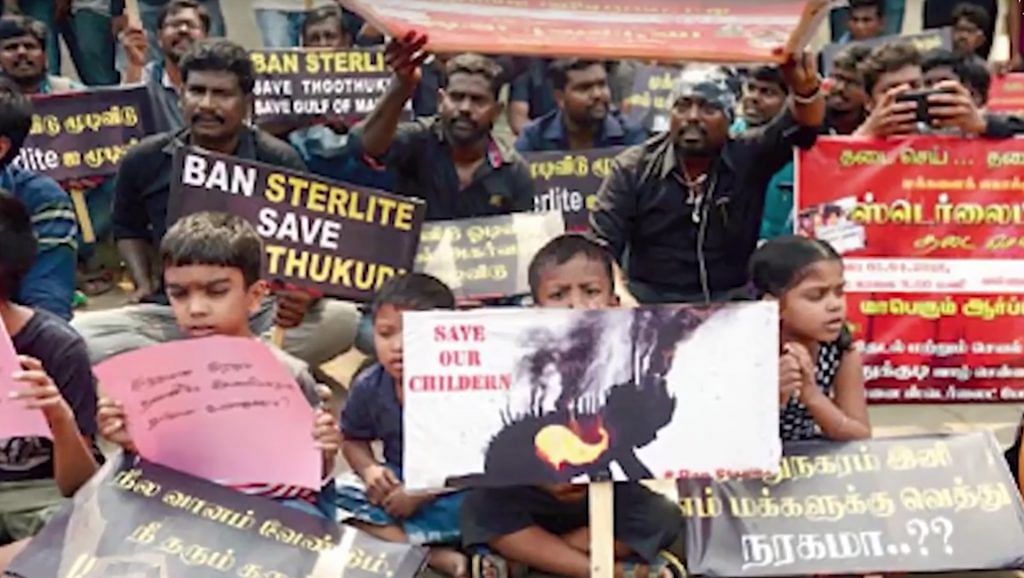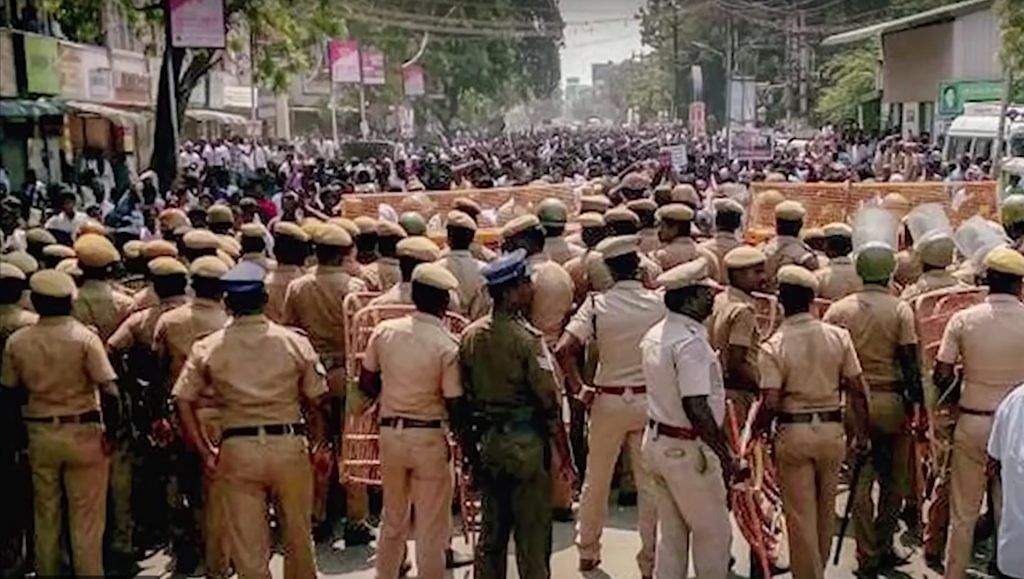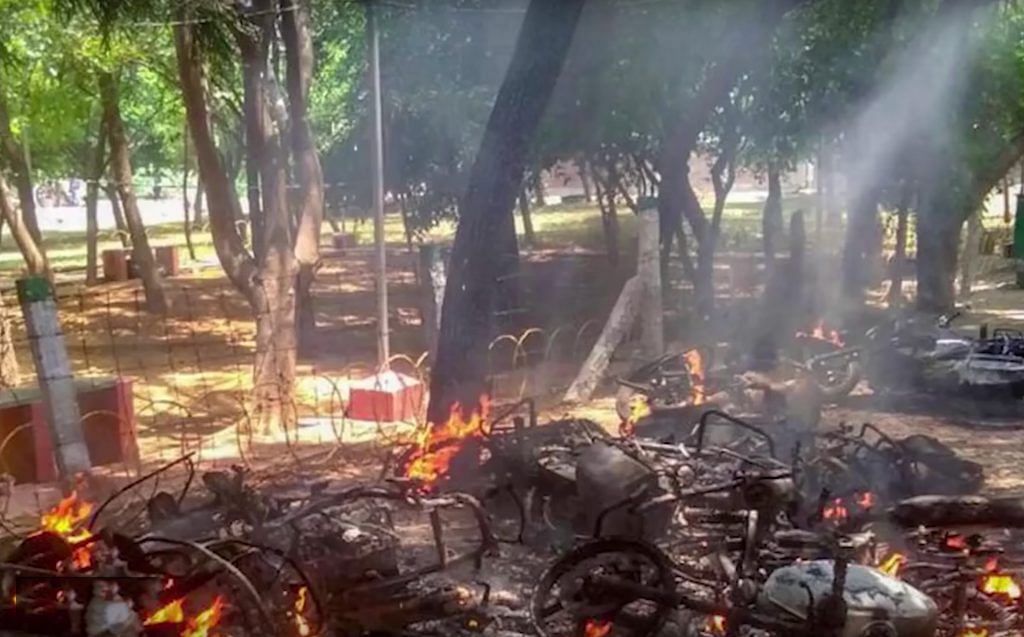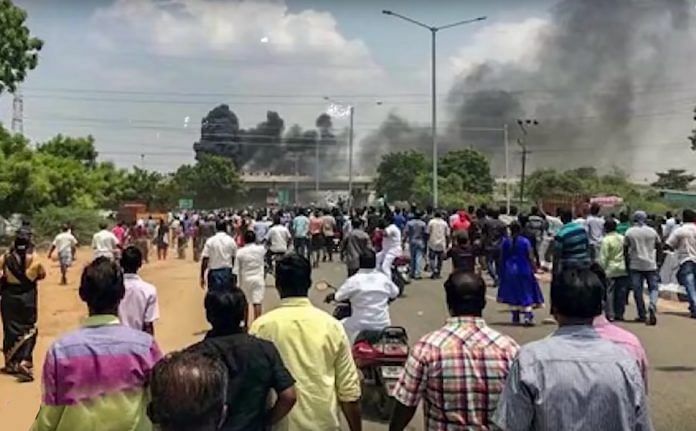From a local fishermen’s issue in the mid-1990s, the anti-Sterlite movement grew to include locals, activists from across TN, and Leftist bodies.
Thoothukudi (Tuticorin): The death of 13 people in a violent protest against Sterlite Copper’s smelter at Thoothukudi on 22 May was not a spontaneous overflow of pent-up emotion. The protest didn’t turn violent overnight on its hundredth day — it had been building up for 22 years.
What started off as a fishermen’s protest in the mid-1990s grew over time to include villages around the plant, and then the entire town of Thoothukudi. Then came activists and organisations from around Tamil Nadu — who have been part of other protests like against the Koodankulam nuclear plant — who the police suspect are radical Leftists. Even a foreign organisation got involved in the movement.
All this eventually boiled over on the fateful day, leading to the Tamil Nadu government disconnecting electricity to the plant and announcing its intention to shut it down permanently.
ThePrint investigated this journey from the ground in Thoothukudi, and found how a local protest transformed into a massive campaign that went out of control.

Also read: Sterlite copper unit in Tamil Nadu was shut down without evidence of ‘toxicity’ or cancer
The first two decades
After the initial plan to set up a unit in Ratnagiri, Maharashtra, faced vociferous protests, the project was moved to Thoothukudi. Soon, local fishermen alleged that the plant was dumping waste in the sea, and began preventing vessels from docking and unloading cargo at the port. Major protests followed after alleged gas leaks in 1997 and 2013, while in July 2017, thousands formed a human chain to protest against a proposed second plant.
Then, in January 2018, two labourers from Kumareddiyapuram village who worked for Sterlite told their neighbours that they had noticed hectic activity for a second plant nearby. With the support of local Thoothukudi-based activists, a group of villagers went to meet the district collector in search of answers. Dissatisfied, they organised a one-day hunger strike on 12 February at VVD Junction in the main city.
Fatima Babu, a local activist who had once contested an assembly election as a candidate of Vaiko’s MDMK, has been at the forefront of the villagers’ protest. “We had permission for just a day-long hunger strike, but at dusk, many villagers refused to get up. They instead walked to the nearby MGR Park and stayed put overnight,” she said, adding that the next day, she was among the many held in police custody.
That was the day when villagers began sitting outside their houses under a neem tree as a sign of protest — the beginning of the hundred-day vigil. Soon, the Thoothukudi Merchants Association decided to back the agitation and called for a one-day strike. Then, on 24 March, a peaceful protest at the same VVD Junction attracted nearly 2 lakh people, attracting a lot of attention across the state. Many different organisations soon extended their support to the cause, some of which, police suspect, may have provoked the eventual violence.

Serious allegations
A senior officer with the Thoothukudi district police said they have arrested more than 250 people so far across Tamil Nadu, with many having links to or being members of organisations such as Makkal Adhikaram, Revolutionary Youth Front, Naam Tamilar Katchi and so on.
The police officer, who spoke on the condition of anonymity as the investigation is still underway, said: “We suspect some of these organisations to be front organisations. These may bone infiltrated by members originally belonging to some banned organisations in the state.”
Thoothukudi-based activists spearheading the protests say gradually, after the 24 March public meeting, organisations such as Makkal Adhikaram actively appeared in the picture. A new group — Village People’s Federation — came into existence, and while a few local villagers were at the forefront, many suspected that the strings were being pulled by these organisations, especially Makkal Adhikaram.
Also read: The element behind the Tuticorin fiasco
Makkal Adhikaram’s defence
Makkal Adhikaram, which translates to ‘sovereign people’s power’, was founded in 2015, and has previously been involved in protests for various causes, such as the closure of illegal liquor shops, illegal sand mining, ban on cattle slaughter, the Koodankulam nuclear power plant etc.
Raju, state coordinator for Makkal Adhikaram, slammed the police’s allegations as “absolute slander”.
“We are an open mass organisation with our list of office bearers known to everybody, including the police… The propagators of this allegation are the intelligence and the BJP. In fact, leaders of the Congress, DMK, CPI, CPM and various civil liberty organisations have come out against this malicious propaganda against us,” he said.
Raju challenged the police to produce even one photograph or a video clipping where Makkal Adhikaram members are seen indulging in arson. He blamed the Thoothukudi police, saying acted like an ‘urban Salwa Judum’ and is making Makkal Adhikaram the scapegoat.
He rubbished charges of Makkal Adhikaram having anything to do with the organising the protests. “The environmental disaster caused by the plant and the diseases like cancer affected the people have enlightened the people. It needed no party or organisation to do it,” he said.
He added that Makkal Adhikaram, which does not have a unit in Thoothukudi, supported the struggle, and several of its members joined the May 22 rally. “But to say that we were the people who organised the protests is untrue. Those committees were non-party organisations and they took their decisions on their own,” Raju said.

UK-based Vedanta-fighter comes calling
In February, members of a United Kingdom-based organisation, Foil Vedanta, also visited Thoothukudi to meet the protesting activists and villagers and offer its assistance. Foil Vedanta describes itself as an independent campaigning organisation focussed mainly on British-Indian mining agent Vedanta, of which Sterlite Copper is a unit.
Activist Fatima Babu said: “They spoke to us about how they helped protestors in Zambia and they can help us too in getting justice from the international courts. Their involvement was just limited to this advice.”
S. Raja of the merchants’ association said: “Financially, it was the merchants’ association that supported the entire campaign for three months, whether it is bearing the cost of the rallies and public meetings, or helping villagers with daily subsistence during the protests.”
Failure to communicate a change of plan
By 11 May, activists and protestors originally leading the movement, various groups organised under the Anti Sterlite People’s Movement, and the Village People’s Federation came together under one umbrella, the Thoothukudi District Anti-Sterlite Forum, to plan something to mark the hundredth day of the protest.
Thoothukudi collector Sandeep Nanduri said: “Actually, their demands as such had been met. On 9 April, the Tamil Nadu Pollution Control Board denied a renewal of the consent to operate Sterlite’s existing unit, while the court was hearing a petition on the proposed second unit. But they still decided to go ahead with marking the hundredth day of the protest in May.”
The government appointed Nanduri as district collector on 23 May, shunting the incumbent collector out after the protest turned violent.
The original plan was to storm the district collectorate, but on 20 May, the district superintendent of police, Mahendran, who was transferred after the violent protests, called the agitating groups for peace talks. He urged the 20-odd members present to hold peaceful protests at the local SAV ground instead of marching to the collectorate.
The members present say they agreed, but by then, there had been aggressive widespread campaigning for the 22 May protest, advertising the venue as the collector’s office. Activists said it was impossible to convey the information to every household in Thoothukudi and the members coming from outside the district in time. Moreover, the hardliners among the protest leaders decided to continue with the original plan.
Catholic community gets involved
On 22 May, members of the Catholic Fernandez community that lives in a settlement along Thoothukudi’s coast, also started marching to the collector’s office from the local ‘Our Lady of Snows’ church. There were reports of picketing since morning, and the numbers only kept swelling.
“Our community has always maintained an anti-Sterlite stand. Members of our church too oppose Sterlite. When the protests were planned, during the Sunday mass, the father at the church urged the community to join the protest in large numbers. Most of our community went, but a number of us could not go because there was a sudden death in a family in our settlement,” said Sarairani, from the fishing village of Threspuram. By that afternoon, she had also lost a relative, 47-year-old J. Jancy, who was walking through the neighbourhood bringing fish curry for her son when she was fired at.
Meanwhile, the police had barricaded roads near the villages close to Sterlite, and as a result, a majority of the original protestors — villagers from Kumareddiyapuram and its neighbouring areas — could not reach the protest site at all.
Also read: Vedanta says it has permission to expand in Thoothukudi, activists say no



